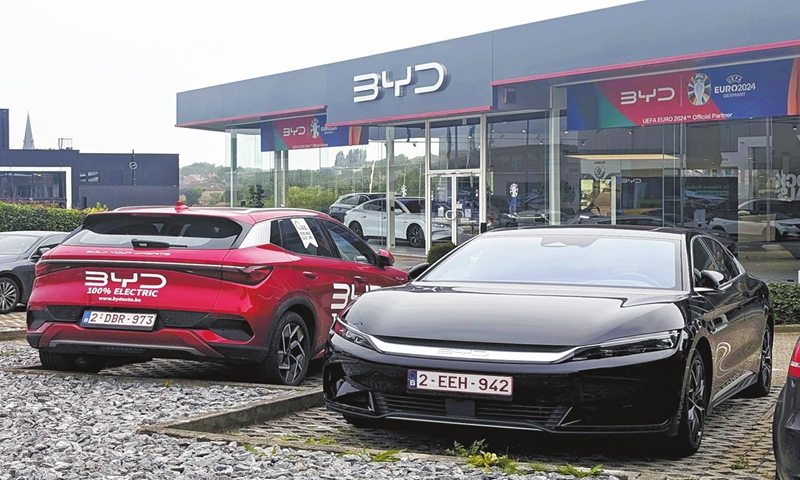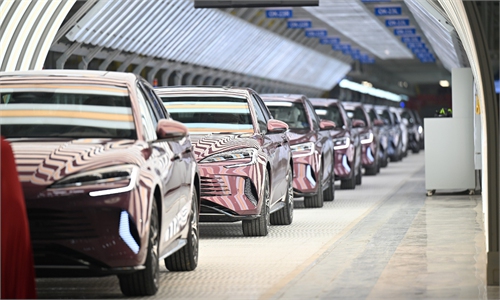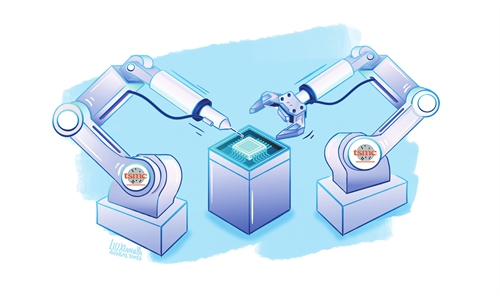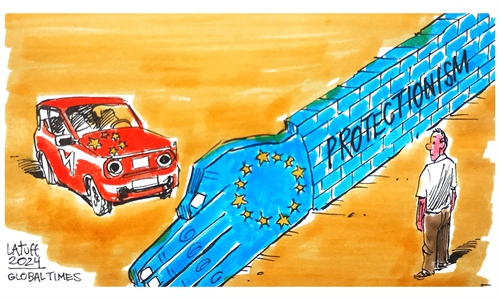EU’s FSR terms discriminate Chinese companies, threatening investor confidence
FSR terms discriminate against Chinese companies, worsening Europe’s investment climate

Vehicles on display at a BYD sales center in a suburb of Brussels, Belgium on July 5, 2024 Photo: VCG
Chinese industry groups said on Friday that the EU's imposition of additional tariffs on Chinese electric vehicles (EVs) and its incessant probes into Chinese companies within the bloc under the so-called Foreign Subsidies Regulation (FSR) - regulation known primarily for deterring foreign companies - have seriously disrupted normal business activities, and undermined fair market environment.
The FSR, which grants European regulators overly broad powers to initiate investigations and raid investment projects mostly involving Chinese companies, needs to be reviewed and restrained, Chinese experts said. Otherwise, the European economic bloc risks losing more investment from Chinese companies, they warned.
The China Chamber of Commerce for Import and Export of Machinery and Electronic Products (CCCME) warned on Friday that the EU members' backing of anti-subsidy measures targeting Chinese electric vehicle (EV) manufacturers will inevitably lead to a loss of investment in Europe.
In reality, many EU members have long hoped that Chinese EV makers could set up factories in Europe to provide decent jobs, the experts said.
The European Commission (EC)'s imposition of high duties on Chinese electric cars, according to some observers, is actually intended to push Chinese companies to invest in Europe, to help boost the EU automotive industry, create local jobs, and achieve green and sustainable development goals.
'Opposite effect'
However, the CCCME warned that "the reaction from Chinese companies indicates that the EU's approach has had the opposite effect."
Before the EU initiated the anti-subsidy probe into Chinese EVs, quite a few Chinese carmakers had already planned to establish their operations in Europe. "Since the EC decided to impose temporary anti-subsidy duties on Chinese EVs, the Chinese EV industry has expressed strong opposition to the EU's actions… Many Chinese companies have voiced significant concerns to our chamber regarding the investigation's results and the potential risks of facing scrutiny under the FSR rising from their European investments," the CCCME said.
Since the beginning of 2024, the EU has launched five investigations under the FSR into Chinese companies. To date, there have been three in-depth probes, one proactive probe and one unannounced raid, with all three in-depth investigations forcing related Chinese companies to withdraw from bidding projects in Europe.
The EU's multiple investigations targeting Chinese companies are very discriminatory, severely distorting fair competition, and bringing significant risks and uncertainties to Chinese companies operating in or investing in Europe, the CCCME warned.
The CCCME said that the "subsidy label" identified in the EU's probes targeting Chinese EVs is likely to become an excuse for future investigations under the FSR into more Chinese-run businesses in Europe, raising deep concerns among Chinese enterprises.
After the European Commission announced levying provisional duties of up to 37.6 percent on Chinese EVs, some major EU member countries voted in support for the move, despite widespread opposition from other member countries and EU industries. Notably, among those who voted in favor of the duties include France, Italy and Spain, according to Reuters.
Strikingly, these countries have been actively courting Chinese EV makers to set up plants in their lands. In May, French Finance Minister Bruno Le Maire said that France would welcome BYD to open a factory in the country, according to Reuters. Spain has also launched an ambitious plan to attract Chinese companies to set up EV and battery factories in the country. Italy is also reportedly in talks with Chinese carmaker Dongfeng Motor Group on setting up a plant in the country.
Investors' concerns
However, Chinese companies are increasingly worried about the business environment in the EU following the EC's announcement of levying high tariffs on Chinese EVs as well as the enactment of the FSR, which has created significant uncertainty for Chinese companies.
Illustrating the profound uncertainty for Chinese investments in the EU, after foreign media reports suggested that Italy has demanded Dongfeng Motor Group agree to safeguards on cybersecurity and data protection as the price of support for a new plant in the country, the Chinese company told the Global Times that the two sides had only held initial talks and have not made any substantive contact.
"Dongfeng hasn't held discussions on issues cited in foreign media reports, including cybersecurity, data protection and a 45-percent localization rate for all components," the company said in a statement sent to the Global Times.
Recent moves by EU authorities under the FSR, including investigations and raids, against Chinese companies have sent a chill through Chinese companies operating in Europe, not just EV makers, experts said.
In total, EU authorities have launched at least five major FSR investigations into projects involving Chinese companies. In March, Chinese train maker CRRC withdrew from a 610 million euro ($660 million) public tender for a Bulgarian railway project, after the EU launched an investigation into the bid under the FSR framework.
On April 3, EU launched two probes under the FSR concerning "potentially market distortive role of foreign subsidies given to bidders in a public procurement procedure." The investigation focused on a joint venture comprising ENEVO from Romania and a branch of LONGi from China, as well as subsidiaries of Shanghai Electric Group. This consortium submitted a bid for a solar panel project in Romania.
On April 9, EU announced the probe into Chinese wind turbine suppliers to the bloc under the FSR. Two weeks later, on April 23, the bloc suddenly conducted an unexpected raid on the offices of a Chinese company in Poland and the Netherlands over subsidy allegations.
Although EU's FSR, which took effect in January 2023 aimed at combating distortions of competition within EU's internal market caused by foreign subsidies, did not single out China explicitly, it has been overwhelmingly targeting Chinese companies, making clear the EU's intention to crack down on Chinese companies, experts said.
Apart from EU's arbitrary investigations and raids, Chinese companies are also increasingly concerned about the EU's attempts to obtain their commercial secrets through the probes.
The China Chamber of Commerce to the EU (CCCEU) told the Global Times that Chinese companies recently reported that the European side had exceeded the scope of the FSR investigation. Despite the opposition of Chinese enterprises, the EU side copied documents containing information about Chinese companies' key technology components, which are classified as commercial secrets, the CCCEU said.
Fighting back
Chinese officials and industry groups have repeatedly criticized the FSR, for its being used as a protectionist tool in the hands of EU to suppress Chinese companies.
On July 10, China's Ministry of Commerce said, at the request of the CCCME, it launched a trade and investment barrier investigation into EU's related practices in its investigations of Chinese enterprises based on the FSR.
Measures investigated involve relevant practices adopted by the EU in investigations such as preliminary examinations, in-depth investigations, and unannounced raids on Chinese enterprises under the FSR terms.
Those EU member countries that want to attract investment from Chinese carmakers need to recognize the fact that supporting additional tariffs on Chinese EVs could result in losing investment opportunities, while an open and fair EU market would be far more attractive for Chinese investors, the CCCME stated.
"Chinese EV companies are closely monitoring the progress and outcomes of the EU's anti-subsidy investigations and will use this information - the member countries' stance on FSR - to assess the risks of investing in Europe and make informed investment decisions," the CCCME noted.
EU's logic targeting Chinese companies is to avoid "any perceived influence" on its rules from foreign investments, as it has linked the construction of a single internal market with the regulation and management of foreign investments, Cui Hongjian, a professor at Beijing Foreign Studies University's Academy of Regional and Global Governance, told the Global Times on Friday.
Such approach by the EU will negatively impact overseas investors' confidence in investing in Europe, while worsening investment environment in the bloc, as it raises trade and investment barriers, Cui said.



